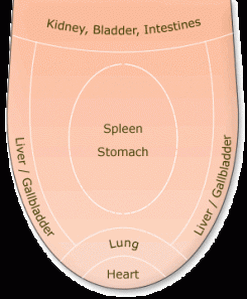Health News
What Your Tongue Tells You About Your Health?
"Stick out your tongue" is one of the first things both Western and Eastern doctors will ask you to do when you consult them, but for completely different reasons. Whereas Western Traditional doctors want to look past your tongue to see whether your throat is inflamed, Eastern Alternative doctors want to look at your tongue itself.For many years alternative Eastern doctors have understood that your tongue is almost like a road map to your health and well-being.
Just like Reflexology understands that there are nerve endings from all over your body in your feet, Eastern Alternative medicine (EAM) understands that by looking at the condition of different areas of your tongue they can tell a lot about which parts of your body are sick.
Every one of your organs and every part of your digestive system has a corresponding area on your tongue. For example if your tongue is red with red dots on it and a thick coating you probably have problems with your large intestine and lower digestive system.
Understanding how the different tongue conditions correspond to your internal health is a very important part of the Eastern medicinal process. It helps the doctor to pin point exactly what is happening inside of your body without having to use invasive methods such as intestinal cameras to find out where the issues lie.
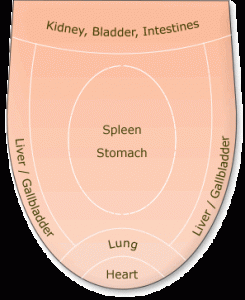 The back of your tongue is associated with your kidneys, bladder and intestines.
The back of your tongue is associated with your kidneys, bladder and intestines.The middle of your tongue shows the condition of your stomach and spleen.
The sides of your tongue tell Eastern Traditional Medicine (ETM) doctors about your kidneys and gall bladder and the front of your tongue tells them about your heart, lungs and cardio-vascular area.
If you already know that you are having digestive problems the tongue is a good way to help ETM doctors figure out what part of your digestive system is playing up.
The back of your tongue indicates your stomach; the rear sides indicate your liver, gall bladder and pancreas; the front part of your tongue indicates your small intestine and the front and side areas indicate your large intestine; the very tip of your tongue indicates the health of your rectum and descending colon.
Take a good look at your tongue in the mirror. What color is it? Does your tongue have a coating over it? Does it have any dots, bite marks or cracks in it? If you do have dots on your tongue what color are they? All of these factors are clues to what is going on inside the rest of your body.
Let's find out what your tongue is telling you about your health. Take a look in the mirror and then ask yourself the following questions about your tongue.
What color is your tongue?
What color is your tongue when you first stick it out? If you leave it out for longer than 15 -20 seconds your tongue will start to cool and change color. You want to check what color it is as soon as it comes out of your mouth.A pink tongue shows good circulation and that your body temperature is probably well regulated and healthy.
A red tongue indicates that your body (or some part of it) is probably overheating. It could be that you have a fever, or that one of your organs is working too hard and retaining too much heat. Often a red tongue indicates that you have a fluid imbalance which is causing poor temperature control inside your body.
A purple tongue indicates poor blood flow, circulation problems and even blockages or areas with sluggish and slow blood flow. The reason that the tongue turns purple is because not enough oxygen is getting around your system to create the red color in your blood.
Purple tongue also indicates coldness in some part of your body, which if you think about it makes sense, because your blood does slow down when you are cold. Sometimes you will have sharp pains in the area where the problem is coming from. It could be anything from chest pains to menstrual cramps. These conditions are made worse by stress.
A White tongue also indicates cold. If your tongue is white you must also check whether it is very wet or drier in appearance.
A Wet white tongue can indicate metabolic problems. I t could be your thyroid and part of the digestive system. Other symptoms you may be feeling are cold hands and feet, tiredness, the need to urinate often and even sometimes erectile dysfunction in men.
A dry white tongue indicates poor circulation, not enough blood moving through the body and low iron levels. Other symptoms you might have are dizziness, poor sleep, dry skin and nails and irregular menstruation in women.
A blotched or multi-colored tongue is actually not a sign of poor health. Many people, especially those with African heritage, are born this way. It has nothing to do with their health. It's just a variation on normal.
Does your tongue have a coating? Is it thick or thin and what color is it?
Now that you know what color your tongue is and you have a better idea about what your metabolism and blood circulation are up to, the next thing you want to look at is if your tongue has a coating on it at all.Your tongues coating tells you a lot about your digestion, mucus conditions and more.
A thin white coating (thin enough to easily see through) is normal and healthy.
No Tongue coating could indicate that you have problems with your digestive system. It can also be connected with low levels of bodily fluids and dehydration. Menopausal women often show no tongue coating when their bodies are experiencing dry hot flushes.
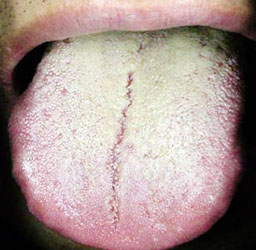 A Thick tongue coating indicates what Eastern doctors refer to as too much "dampness" in your body. It can be caused by problems with your spleen, water retention and poor absorption of body fluids. These conditions can make you produce a lot of phlegm which you might then start coughing up. This phlegm can also build up in other parts of your body and cause you to get "pins and needles" (go numb) or have problems with blocked ears.
A Thick tongue coating indicates what Eastern doctors refer to as too much "dampness" in your body. It can be caused by problems with your spleen, water retention and poor absorption of body fluids. These conditions can make you produce a lot of phlegm which you might then start coughing up. This phlegm can also build up in other parts of your body and cause you to get "pins and needles" (go numb) or have problems with blocked ears.If the thick tongue coating is white it may be connected to poor circulation which causes coldness in your body, depression and low energy levels.
If the thick tongue coating is yellow it indicates toxins and problems with the organs that are supposed remove toxins from your body. It is made worse by smoking, which not only stains your tongue but also adds more toxins for your body to try and fight off. Yellow coating is associated more with warmth is the body and it is less likely that you have circulation problems than if the coating is thick and white.
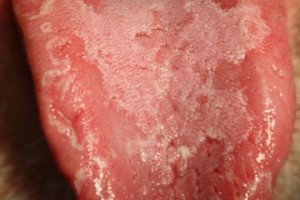 Geographical tongue coating is a coating over only some areas of the tongue and usually indicates that your body doesn't have enough digestive fluids to be able to digest your food properly. You might also have heart-burn or always feel hungry but struggle to pass solid waste.
Geographical tongue coating is a coating over only some areas of the tongue and usually indicates that your body doesn't have enough digestive fluids to be able to digest your food properly. You might also have heart-burn or always feel hungry but struggle to pass solid waste.A tongue coating at the back of your tongue shows that your digestive system is blocked up with grease and other substances that are difficult to digest. You should cut down on fatty, refined foods.
A tongue coating on the middle of your tongue shows that you might have issues with your heart and lungs, although like a back tongue coating it can also be associated with poor diet, in this case affecting your spleen and upper digestive tract. You probably feel tired and nauseous a lot of the time if this is the case.
Do you have any cracks in your tongue?
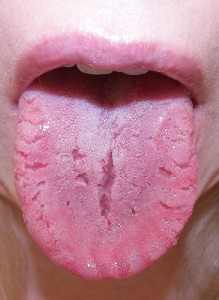 A normal, healthy tongue should have no cracks in it. Cracks in your tongue are usually caused by your body becoming dehydrated and not having enough fluids to go around. But the solution isn't always simply drinking more water. Sometimes you can drink enough fluids but your body is having trouble absorbing them. So even though you are drinking water your body is dehydrated. This would cause cracks in your tongue.
A normal, healthy tongue should have no cracks in it. Cracks in your tongue are usually caused by your body becoming dehydrated and not having enough fluids to go around. But the solution isn't always simply drinking more water. Sometimes you can drink enough fluids but your body is having trouble absorbing them. So even though you are drinking water your body is dehydrated. This would cause cracks in your tongue.Cracks can also be caused by any organ that is not functioning normally and because of that is creating "heat" somewhere in your body. This heat upsets your fluid balance, causing cracks in your tongue.
Cracks in your tongue are a strong indicator that there is some underlying chronic health issue that needs to be addressed. If this is the case you will also experience other symptoms which are most likely worse in the heat of the day when your body is trying to keep itself at a healthy temperature. Other symptoms of a fluid imbalance include back pain, dry throat, restlessness, flushed cheeks and even premature ejaculation.
How many cracks are in your tongue?
If you have many cracks all over your tongue and are also over weight you should be very watchful for symptoms of diabetes. Cracks all over your tongue combined with being overweight is a strong indicator of diabetes.Fish Gill cracks can be caused by too much fluid in the digestive system or spleen. They are usually coupled with either a thick tongue or a very wet tongue. The reason that you get cracks in your tongue is that your body registers that it has enough fluids, and so stops sending them around your body to hydrate you.
This is a spleen dysfunction. It is another kind of fluid imbalance and sometimes requires a diuretic to help get excess fluid to be flushed out of the body.
Do you have any teeth marks or bite marks on your tongue?
Next relax your tongue and have a look at if there are any tooth marks or bite marks.If you have no bite marks on your tongue that is normal.
Slight bite marks could be caused by lack of sleep. If you are getting enough rest but still have bite marks then it could be because of problems with your spleen. Your spleen is partially responsible for regulating your body fluids. If your spleen dysfunctions you may suffer from water retention. This causes your tongue to swell and lose some of its muscle control and be pushed into your teeth, causing slight bite marks on your tongue.
In the case of spleen problems you will probably also experience nausea, stomach growling noises, loose stools and in severe cases even vomiting of clear fluids.
Do you have spots on Your tongue?
No Spots on your tongue is normal and healthy.Spots at the back of your tongue only indicate inflammation and poor blood flow in the lower abdomen. It could be that your diet is causing a back log of gunk in your large intestine.
If the spots on the back of your tongue are red in colour then it is even more likely to be a hot or inflamed condition in your large intestine.
Spots all over your tongue could suggest liver problems or problems in your blood itself.
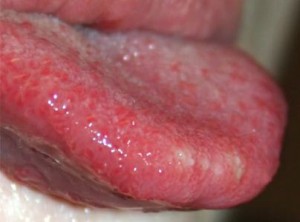 Red spots all over your tongue suggest heated problems in your liver which are causing your blood to be hotter than normal and less bale to flush out toxins.
Red spots all over your tongue suggest heated problems in your liver which are causing your blood to be hotter than normal and less bale to flush out toxins.Purple or Brown Spots all over your tongue suggest that your blood is not moving and circulating well. This is usually also liver related, because your liver regulates your blood, but purple or brown spots suggest more severe liver problems.
Spots on one side of your tongue only are closely related to your liver problems, but are more likely caused by inflammation in the gall bladder, which works with your liver to regulate your blood.
If these one sided dots are red that indicates an inflammation in either gall bladder or liver. Other symptoms include pain in the area, moodiness, headaches and sore eyes. Conditions may be worse in women when they are premenstrual and improve naturally after a few days.
Spots on the tip of your tongue are believed in Traditional Eastern medicine to be caused by heat rising from the liver or lower abdomen toward the heart. They say the heat is in your blood. People with these spots are often passionate and dramatic, as if the heat in their hearts is actually making their emotions "louder" or more difficult to ignore. The cause for this heat in the blood can be due to liver conditions, haemorrhagic fever or even heavy menstrual flow. If you have severe emotional symptoms such as rage and irritability you should consult a professional Eastern Medical Practitioner.
What color are the spots on your tongue?
Red spots. The rule of thumb is that red spots are connected to heat and inflammation in the body. This could be caused by infection or problems with the spleen and its ability to control blood flow. Red spots and heat are also associated with heavy menstrual cycles in women. Eastern Traditional doctors have some interesting things to say about people with "heat" in their blood but we all know how irritable we feel when we are over-heating and not feeling well.Purple Spots are caused by slow blood flow. The blood is often too thick and can't move around your body fast enough to get enough oxygen around your body. If red spots are not treated they may become purple.
Brown or Black Spots are caused by stagnant or slow blood flow, just like purple dots. Usually they become darker when the condition is not treated.
As you can see there is a lot that you can find out about your health by looking at your tongue. Needless to say this is a guideline. Tongue analysis is just one part of the full examination in traditional eastern medicine.
There are many other factors and symptoms that a traditional eastern doctor will look at during a full examination. Their approach is holistic, which means that they look at the whole picture to find out what your underlying illness is.
This approach helps them figure out exactly what the best medicines will be for you, specifically. For a full tongue analysis you should consult a Traditional Eastern Medical practitioner.
